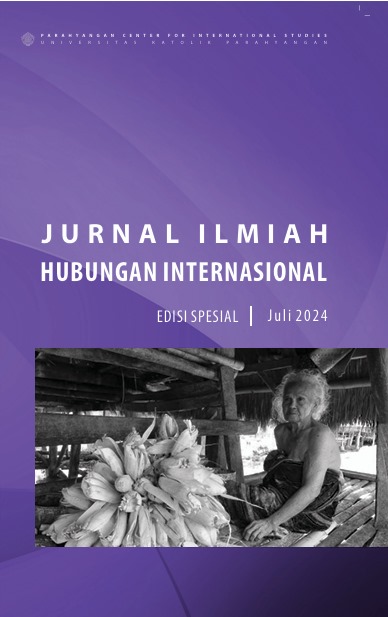Gender Disparities in Climate Resilience: Amplifying Voices of Women in Climate Change Issue in Indonesia’s Chairmanship of ASEAN 2023
DOI:
https://doi.org/10.26593/jihi.v1i1.7691.157-173Abstract
Indonesia officially received the mandate as Chair of ASEAN from January 1 to December 31, 2023. During the post-COVID-19 pandemic, in the period 2022-2023 Indonesia received appreciation from the international community regarding the successful organization of international forums including the G-20. Indonesia's attitude is considered to remain neutral and maximize Indonesia's function as a middle-power at the level of multilateralism, amid geopolitical conflicts such as the Ukraine-Russia conflict and regional instability in the Middle East. But on the other hand, there are other issues in the realm of low politics, including the issue of climate change and women's vulnerability. As a region with a long coastline, it has a high potential risk as a chain effect of climate change. In addition, the gender disparity that is still quite high in this region is one of the factors that make women vulnerable to climate change issues, such as vulnerability in the labor, health and gender-based violence sectors. This paper focuses on seeing the extent to which Indonesia's role as chair of ASEAN in 2023 advocates the issue of climate change in a gender framework. The concept of Gender Equality and Social Inclusion (GESI) which focuses on women's participation in the public sector and policy initiation is used as a framework. The expected results of this study can show the relationship between environmental issues and women's vulnerability and the imbalance between women's participation in the public sector and policy initiation.
Keywords: GESI, women, climate change, ASEAN Chairmanship, Indonesia.
Downloads
Published
Issue
Section
License
Copyright (c) 2024 Jurnal Ilmiah Hubungan Internasional

This work is licensed under a Creative Commons Attribution 4.0 International License.
This journal uses Creative Commons license (CC BY). We allow readers to read, download, copy, distribute, print, search, or link to the full texts of its articles and allow readers to use them for any other lawful purpose. The author must be aware that the article copyrights will be fully transferred to Jurnal Ilmiah Hubungan Internasional only if the article is accepted to be published in the journal through signing of the Copyrights Transfer Agreement. Authors are allowed to resend their manuscript to another journal or intentionally withdraw the manuscript only if both parties (JIHI and Authors) have agreed on the related issue. Once the manuscript has been published, authors are allowed to use their published article under Jurnal Ilmiah Hubungan Internasional copyrights.





